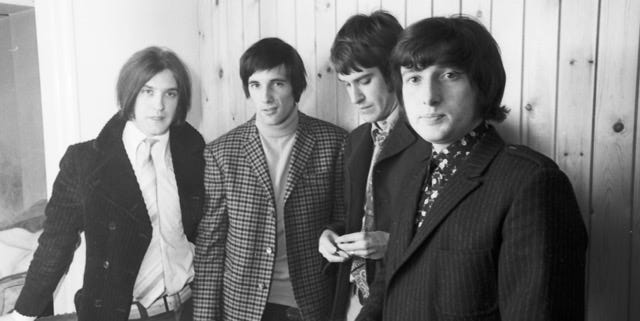When The Kinks Matured: The Kinks' 'Face to Face'
Yesterday was the 80th birthday of my all-time songwriting hero Ray Davies. Davies was the lead vocalist and primary songwriter for The Kinks - a classic rock band formed in the early 60s with his brother Dave on lead guitar, Pete Quaife on bass, and Mick Avory on drums. I’ve written about them so many times: honestly, the band produced some of the most original, beautiful, and melodic rock songs of their generation; songs that revealed the extent of Ray Davies’s genius.
To celebrate the Ray’s birthday, I’m reviewing the band’s 1966 LP Face to Face. Face to Face was a creative breakthrough for the group. The album was the first project that featured a tracklist of all original material; it was released during a tumultuous period for the band since Ray experienced a mental breakdown and Quaife left the group temporarily after going through an accident; the project, in hindsight, was one of the first pop concept albums.
Relistening to the project, it’s clear that Face to Face demonstrated Ray’s maturation artistically and personally. The LP is the band’s transition from the garage, R’n’B sound that got them famous - epitomised in songs such as ‘You Really Got Me’, ‘Till the End of the Day’, and ‘Set Me Free’ - to a more arts-y, folk-y, baroque sound that would characterise their best albums such as Something Else, The Kinks are the Village Green Preservation Society, and Arthur. The tracks on Face to Face has Ray at his most vulnerable: songs that reveal a mind at only 22 years young dealing with members of his family departing to live their lives to the full (‘Rosy Won’t You Please Come Home’), the vagaries of having an artistic mind (‘Too Much on my Mind’), and the shallow nature of worldly success (‘House in the Country’/ ‘Holiday in Waikiki’).
‘Rosy…’ is such a great song because of its simplicity. It’s a blues number, which fits the sombre sentiment of the track, given that Ray admitted that he sobbed when he found out that his sister was moving away to Australia with her husband. The bluesy melody and harpsichord combine to a devastating effect on the chorus, which makes the number all the more poignant since it supplements the tragic lyrics (“Rosie, won't you please come home?/Mama don't know where you've been”). It’s probably my favourite song on the LP if you were to put a gun to my head.
Ray explores the uncomfortable reality of a serial philanderer in ‘Dandy’. The stripped back track is very good: the cautionary tale of a womanizer in the lyrics is foregrounded and Ray’s sarcasm is all the more apparent too. There’s so much truth in the lyric: “two girls are too many, three's a crowd and four you're dead”, as the more romantic partners a man has in his life, the higher the chance of chaos and destruction for all parties involved.
‘Too Much on My Mind’ has Ray at his most honest about his mental health. A mind clouded by thoughts to the point of inertia, Quaife’s bass really holds the track together, selling its sombre tone. Nicky Hopkins’s harpsichord is brilliant: the song has the class it does because of it, and I see why bands such as Spoon took the sound as inspiration for their LPs such as Girls Can Tell.
The songwriting is more observational as well: songs such as ‘House in the Country’, ‘Holiday in Waikiki’, and ‘Most Exclusive Residence for Sale’ has Ray lambasting the delights the world has to offer in exclusive holidays, stately homes, and material wealth. ‘House in the Country’ is a real rocker, with the song depicting the stereotypical yuppie with a house in the country he can retreat to whenever the city becomes too intense for him: I see why Blur had the audacity to write ‘Country House’ after listening to this one because it’s a fundamentally accurate observation.
The satire is very strong on ‘Most Exclusive Residence for Sale’, as Ray depicts a profligate who loses everything in court, whilst the backing vocals from Dave and Quaife “ba, ba, ba, ba” away at the hook. Despite the strange drum solo at the bridge, I really like the portrayal of malcontent among the elite on ‘Little Miss Queen of Darkness’: Ray - with a Bob Dylan swagger - presents the misery that the haves experience despite their privileges and advantages, all the more intensified by the fact that they must keep up an optimistic front.
‘Sunny Afternoon’, the single released before the album was dropped, is the crown jewel though. It’s simply brilliant: Ray’s lyrics are sensational and his wit shines through in his sardonic words that present the ingratitude of the carelessly wealthy. Dave’s guitar riff is iconic, the backing vocals (that include Ray’s wife at the time Rasa’s contribution) are angelic, and overall it’s for good reason that it was number one on the charts; that it was played when England won the world cup in 1966: the song’s legacy is richly deserved. It’s The Kinks’ finest moment on tape.
Face to Face isn’t a perfect album: it’s not bookended particularly well compared to their next outing in Something Else, but it’s a real step up for the band at the time. The Kinks showed a measure of their potential with this LP, and they ended up fulfilling it wholly a couple years later.
The project is a real insight into Ray’s mind. A mind that was clearly experiencing weltzschmerz, a mind jaded by what life appeared to be about. But in the torment of his private hell, Ray managed to engineer an album that’s truly influential, an album that’s witty, an album that demonstrates a level of his songwriting genius that would prove to be inspirational for rock bands in the future.



